Table of Contents
E-commerce has swiftly raised the bar for trading due to its variety of benefits compared to traditional ways. The convenience, cheapness, and user-friendliness of e-commerce are why it is a popular trade mode.
Equally, features such as customer segmentation, data analysis and marketing automation among others have helped businesses to serve a wider market. Therefore, there will always be high demand for ecommerce solutions.
Against all odds, global e-commerce sales jumped 27.6% to top $4 trillion throughout this year only. This kind of growth shows that e-commerce is still an expanding industry with a lot of potential in the future. It is appealing to both small and big businesses because they need to match up with changing consumer preferences while staying at par with competition across the globe.
Best Programming Language for an E-Commerce Site

Choosing the right programming language is vital because it is integral to the development process. It is a difficult choice when you have many options to pick from in terms of programming languages. Some things must be considered before deciding to ensure that the results are what one would have desired.
The budget, platform, performance, and security, among others, are key factors to consider initially. Furthermore, we have provided a brief review of top programming languages for an e-commerce website along with merits and demerits so that you can decide wisely.
So, let’s get started!
5 Top Programming Languages for Creating an E-Commerce Site
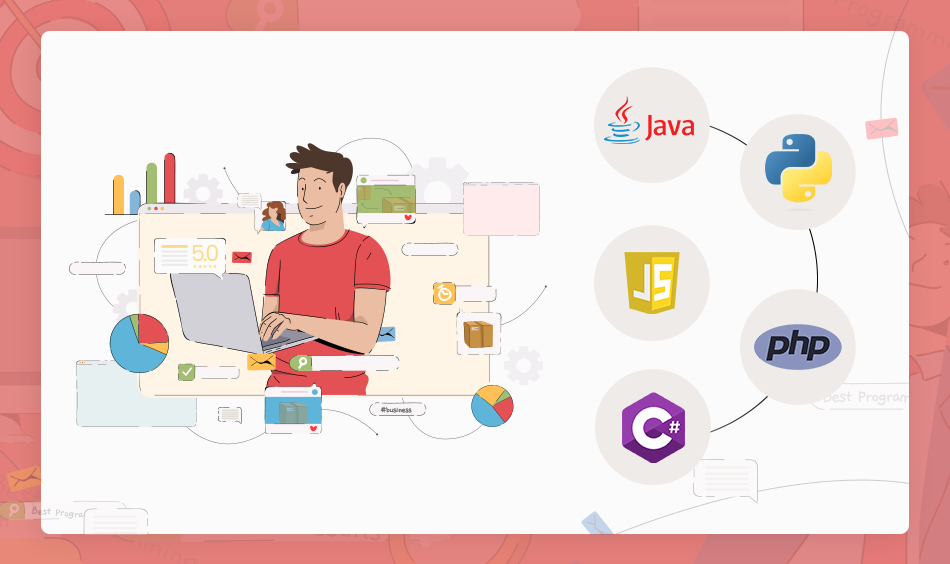
The choice of programming language is key to developing a secure and engaging online platform in eCommerce store development. Adaptability, performance, and responsiveness of the community are why five languages dominate. They are said to be simple but effective in that they make it possible for developers to create seamless e-commerce experiences, which satisfy diverse business needs.
Both experienced programmers and those new to coding need to learn these languages so as develop scalable and full-featured e-commerce sites. JavaScript is speedy while Python has efficiency; this makes each language a perfect Ecommerce Store Development pick.
Here is the overview of the top 5 programming languages that underpin all e-commerce today, giving you what you need to launch successfully into an online business:
1) Java
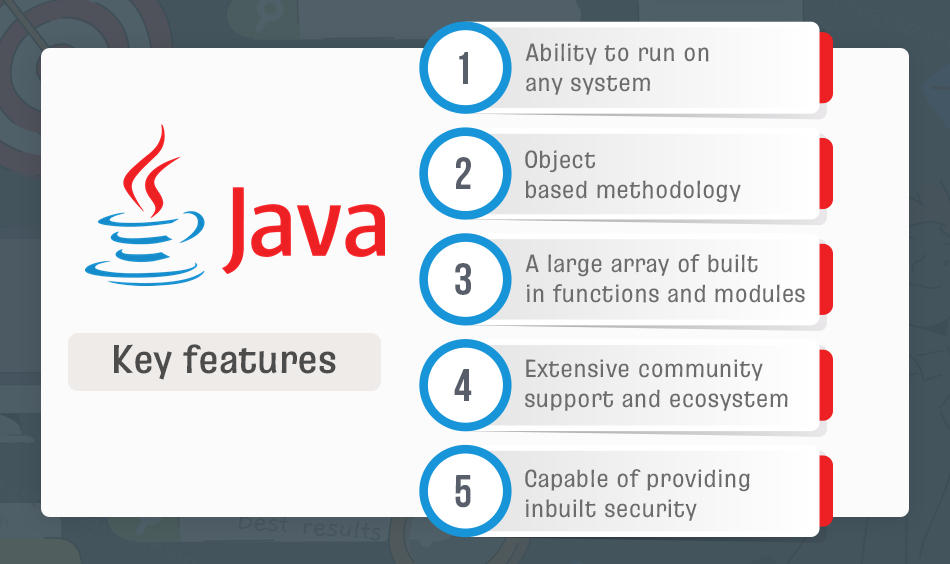
Java, a well-known programming language, has become famous for its use in developing strong e-commerce sites. The platform independence of Java is well documented, allowing developers to write once and run on any device or platform, thus ensuring a smooth user experience across devices. Being an object-oriented language, it is easy to create modules that can be scaled up; hence, it is a good tool for creating intricate e-commerce applications.
Again, the extensive standard library of Java offers numerous pre-built components and tools, thus making development easier. Regarding resources and solutions for creating feature-filled e-commerce platforms, there is no better offer than what comes with the strong community support and wide range of frameworks and libraries available in Java.
Furthermore, added security features within Java, such as bytecode verification plus encryption capabilities, allow for secure customer data storage, fostering trustworthiness while using this technology for business purposes at all times.
Key features:
- Ability to run on any system
- Object-based methodology
- A large array of built-in functions and modules
- Extensive community support and ecosystem
- Capable of providing inbuilt security.
2) JavaScript
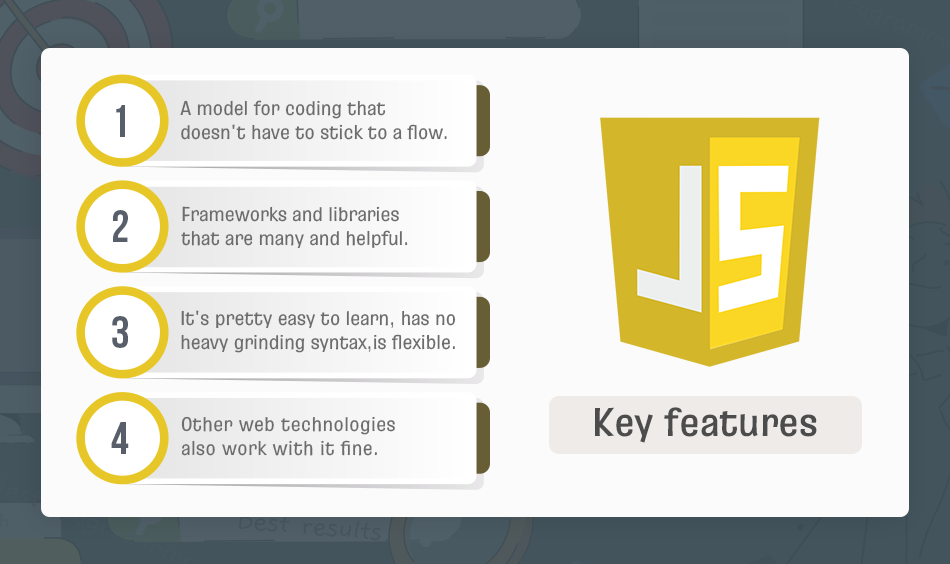
JavaScript is a very dynamic programming language that has become so popular in creating responsive and interactive elements in online stores. Its multiplicity makes it an important aspect of web development hence developers can improve the user experience and functionality of their websites. This means that JavaScript can be used on both client and server side, enabling e-commerce sites to supply dynamic content without reloading pages.
Besides, JavaScript does it this way through non-blocking execution using asynchronous programming which helps it perform smoothly and responsively. Besides, the lightweight nature of its syntax together with its flexibility allow fast prototyping making quick iterations possible. Moreover, because JavaScript works with other web technologies such as HTML and CSS seamlessly integrates dynamic components into e-commerce websites.
Key features:
- A model for coding that doesn’t have to stick to a flow.
- Frameworks and libraries that are many and helpful.
- It’s pretty easy to learn, has no heavy grinding syntax, and is flexible.
- Other web technologies also work with it fine.
3) Python
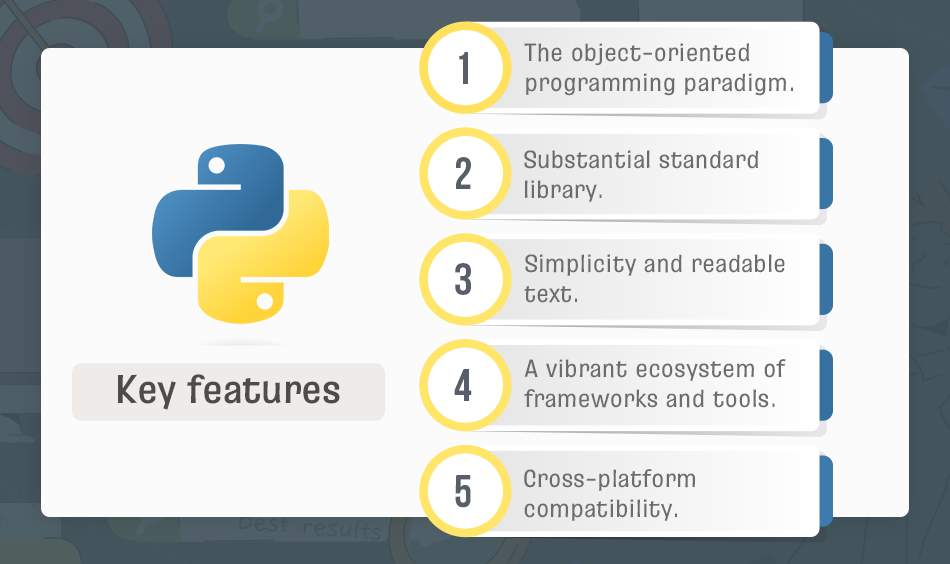
Python is a programming language that is both adaptable and effective. It is often used to generate e-commerce sites. Many attributes make it suitable for constructing strong online stores and markets. The way Python uses objects in its code helps create smaller, more organized codes that are easier to maintain and that facilitate expansion of e-commerce platforms.
In order to save time during development, Python contains many pre-built modules in its extensive standard library which perform different functions such as handling data, processing images, interacting with databases etc.
Moreover, team members can collaborate more easily due to Python’s simplicity and readability, leading to faster development cycles. It has strong community support with frameworks such as Django and Flask, designed specifically for eCommerce Store Development, creating an amazing ecosystem of frameworks and tools that further improve productivity. In addition to this attribute, python applications can be run across all operating systems; thus, they are cross-platform.
Key features:
- The object-oriented programming paradigm.
- Substantial standard library.
- Simplicity and readable text.
- A vibrant ecosystem of frameworks and tools.
- Cross-platform compatibility.
4) C Sharp
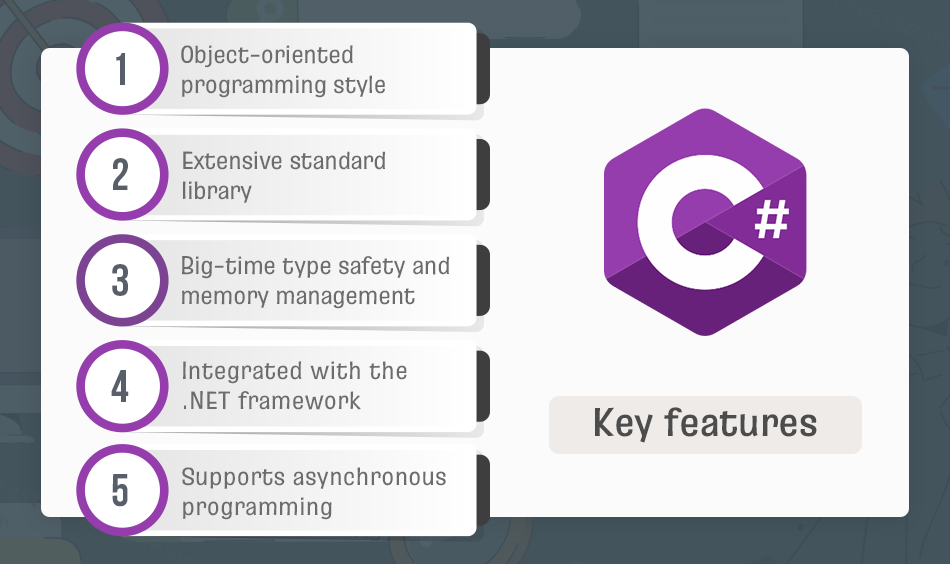
C# (called C sharp) is a powerful and diverse programming language widely employed in constructing e-commerce sites due to its strength, speed, and extensive framework support. It is suited to building expandable and secure online platforms for this reason.
C# employs an object-oriented programming (OOP) paradigm where developers arrange their codes into reusable objects that enhance the modularity and maintainability of e-commerce applications. Developers can use the rich standard library in C# with many built-in functionalities such as data manipulation, networking, and security, thereby minimizing dependency on third-party libraries.
Besides, C# provides strong type safety and memory management, which guarantee reliability and efficiency in an e-commerce website, especially when dealing with large volumes of transactions and user data. Furthermore, integration with the .NET framework ensures developers have everything they need to easily make Top Shopify plus apps: tools, libraries, APIs, etc. In addition, asynchronous programming is supported by C#, which enables them to create a responsive and scalable e-commerce platform capable of handling concurrent user requests effectively.
Key features:
- Object-oriented programming style
- Extensive standard library
- Big-time type safety and memory management
- Integrated with the .NET framework
- Supports asynchronous programming
5) PHP
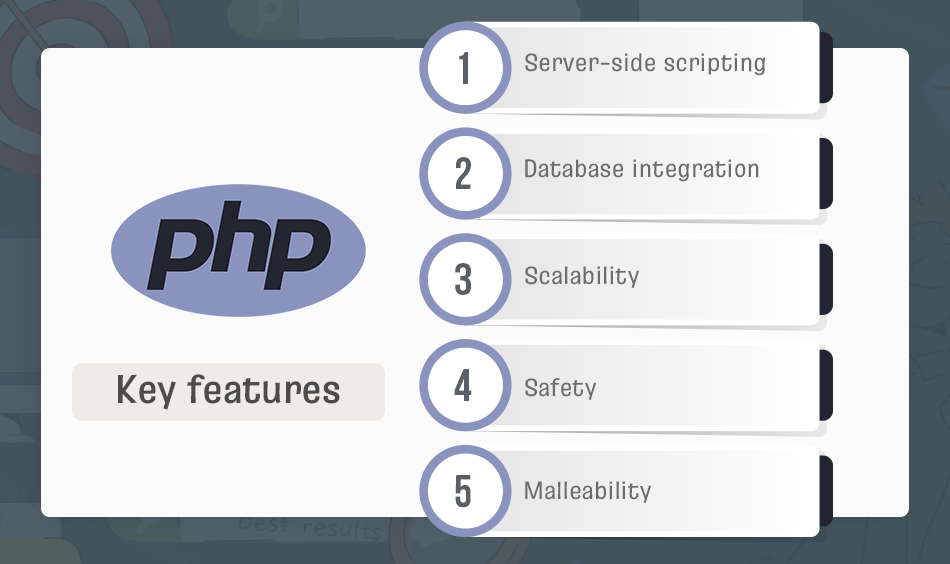
PHP or Hypertext Preprocessor is a language that is used by many web developers for server-side scripting. PHP was initially created by Rasmus Lerdorf in 1994, but it has since evolved into a very powerful programming language supporting many websites such as e-commerce. One of the reasons why PHP is widely known and used is because of its versatility and simplicity.
PHP scripts are executed on servers and the resultant dynamic content delivered to the browser of the user that requested the page. This attribute is extremely beneficial particularly in respect to e-commerce since it enables creation of interactive and personalized shopping experiences. It easily connects with databases like MySQL which enables enterprises to handle product catalogs, customer accounts, and transactions.
Key features:
- Server-side scripting
- Database integration
- Scalability
- Safety
- Malleability
Comparison Chart
| Feature | Java | JavaScript | Python | C Sharp (C#) | PHP |
|---|---|---|---|---|---|
| Paradigm | Object-oriented | Multi-paradigm | Multi-paradigm | Object-oriented | Multi-paradigm |
| Usage | General purpose | Web development | General purpose | General purpose | Web development |
| Syntax | Strongly typed | Weakly typed | Dynamically typed | Strongly typed | Weakly typed |
| Platform | Cross-platform | Cross-platform | Cross-platform | Windows-centric | Cross-platform |
| Community | Large community | Large community | Large community | Large community | Large community |
| Performance | High performance | Moderately fast | Moderate performance | High performance | Moderate performance |
| Learning Curve | Moderate | Easy | Easy | Moderate | Easy |
| Popular Frameworks/Libraries | Spring, Hibernate | React, Angular | Django, Flask | .NET Core, ASP.NET | Laravel, Symfony |
What to Consider When Choosing a Programming Language
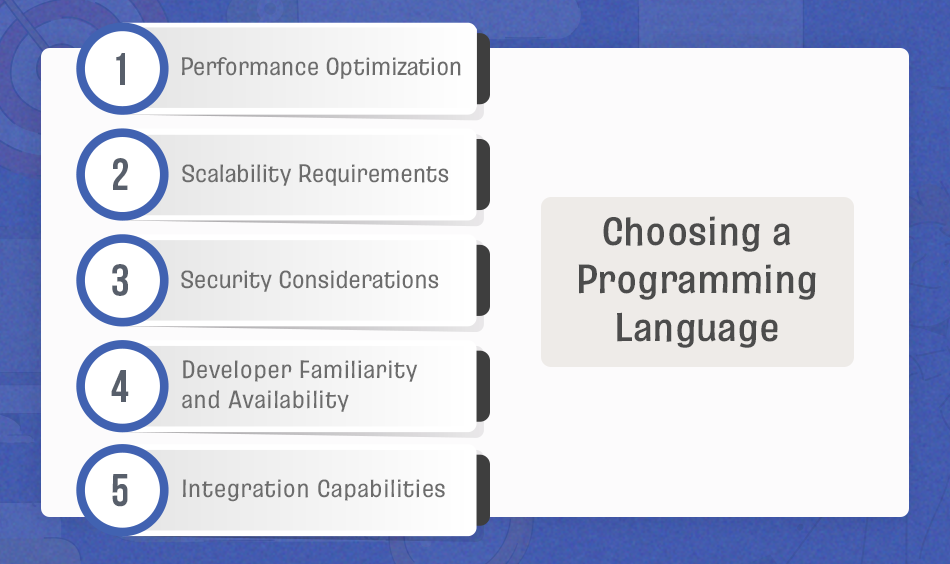
- Performance Optimization: The selection of programming language significantly influences the speed and efficiency of e-commerce sites. For a better user experience, some languages are naturally faster than others while reducing the page load time. Choosing a performance-oriented language increases the site’s responsiveness, resulting in more satisfied clients and higher conversion rates.
- Scalability Requirements: An e-commerce site should be able to accommodate any fluctuations in traffic that may occur due to seasonal shopping or promotional activities. It is very important while choosing a programming language for an application because there will be spaces available for scaling it with more buyers, discounts and at the same time maintaining its quality and performance of reliability. As such, when they can use scalable languages without any technological restrictions imposed on them, these companies can grow their online presence.
- Security Considerations: In e-commerce, trading sensitive customer information like payment details and personal data makes security paramount. During the website design process, it is necessary to consider whether or not the programming language used in it incorporates robust security features and supports standard encryptions protocols that will go a long way in safeguarding against cyber threats. For example, when there is a secure language, it minimizes risks of vulnerability to hacking and other cyber-crimes as well as ensuring compliance with legal frameworks that will make users trust the website.
- Developer Familiarity and Availability: One of the most important factors determining whether a website will be successful is the presence of skilled programmers conversant with that particular programming language. Choosing a popular language with a big community of developers guarantees useful knowledge and guidance, making looking for experienced specialists for this e-commerce project easy. Furthermore, using languages that developers are used to can speed up the process of development and minimize risks connected to errors.
- Integration Capabilities: It is common for e-commerce sites to rely on various third-party providers and technologies, such as payment gateways, shipping providers, and analysis tools. A good choice of applied programming language can enable the connection with these external systems via strong APIs and libraries. Similarly, the compatibility aspect of popular e-commerce platforms and frameworks makes integration processes easier; hence, businesses have a chance to tap into the rich toolkits available in this space for their web operations.
Conclusion
Make sure to be watchful when choosing a programming language for your e-commerce site as it will greatly affect the functionality of your website. Each of these languages has its own strong points and can be used best for different purposes. The size of the project, budget considerations and developers’ skills should all be taken into account while making this decision.
At times, it might just make sense to mix several programming languages and frameworks together. For instance, PHP supports front-end interactivity through JavaScript whereas Python or Ruby enables some features in this case. In the end, however, what determines whether an ecommerce platform is right for you is how well it meets the specific needs of your business and goals you set out to achieve through that site.
In case you still have doubts about which language will develop your e-commerce websites, please do not hesitate in contacting our team! We are proud to say that Shiv Technolabs supports a number of major brands’ e-commerce projects out there. Our experience and expertise would be gladly shared with you!




















